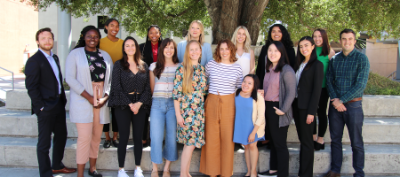Center for Juvenile Law and Policy Bolster Fight Against COVID-19

In April’s Justice Collaborative Institute Report, "To Protect Our Children and Fight the Coronavirus, Release Youth from Juvenile Detention," Loyola Law School Juvenile Justice Clinic Director Samantha Buckingham writes that, “Juveniles in detention are especially vulnerable during pandemics due to the additional stress and trauma associated with increased restrictions and isolation. Lockdown and confinement practices force solitary-like conditions on every juvenile in detention, including near-total isolation from family and loved ones, as well as from each other. This can result in serious long-term damage to each young person in juvenile detention, and there is no evidence to suggest the additional restrictions will inhibit pandemic acceleration."
The Juvenile Justice Clinic (JJC) and the Youth Justice Education Clinic (YJEC), both part of the Center for Juvenile Law and Policy, immediately responded to the urgency of this situation for their young clients, many of whom are foster youth. In March, for example, by stressing how the client and community could be kept safe with the client at home and how the client could better access education in the community, the students from both clinics students argued successfully to achieve release from a detention facility for a vulnerable young client just hours before the facility excluded family members from visiting. This client was able to shelter in place at home and take advantage of education supports, and due to his hard work and the vigilant advocacy of his JJC team, he ultimately obtained a deferred entry of judgment, an outcome with zero collateral consequences once he successfully completes probation. The JJC team shared sample pleadings with defenders throughout the state to assist in making arguments for release of their clients facing similar circumstances.
Facing court closures and delays in making this same argument for one client at a time, a team of CJLP faculty, staff, students, and clinic alumni quickly collaborated to petition for a writ of mandate seeking immediate release of many youth and expedited review of additional cases. The CA State Supreme Court unanimously agreed that this extraordinary remedy was merited under these extraordinary circumstances, and last week granted an order to show cause as to whether juveniles detained in LA County are being denied due process by being held in conditions that could subject them to contracting Covid 19.
CJLP’s efforts reach beyond the court system, however, as YJEC staff and students strive to hold the Los Angeles County Education Department accountable for providing the education services to which their clients are entitled. YJEC has been a leading advocate to safeguard educational opportunities for youth throughout this crisis, from bringing together education advocates in workgroups to address challenges with remote learning to co-authoring recommendations for improving education in Los Angeles County juvenile facilities. “We’ve noticed advocates quickly come together to collaborate,” said Megan Stanton-Trehan, Adjunct Professor and Director of the Youth Justice Education Clinic (YJEC) at Loyola Law School. She added, “the silver lining in all of this is that we hope these newly forged partnerships will continue to benefit our client community even after the crisis subsides.”
Another silver lining is the experience afforded to the clinic students, who are key to these efforts. “Serving YJEC clients during the Covid-19 crisis allows me to apply my advocacy skills on a real-time basis, react creatively to issues as they come up, and influence policy on the ground,” says 2L student Carly Klein, who helped to draft a public comment from YJEC to share at the Los Angeles County Office of Education (LACOE) board meeting and who voiced CJLP concerns about the handling of the Covid-19 quarantine and school closures. When at the meeting LACOE board members responded directly to these comments, says Carly, “I got a real sense of participation as a stakeholder in the education advocacy community.”
In response to the wide range of advocacy to which she was exposed in CJLP, student Kayla Burchuk, '20, commented that "in future crises, I will always remember that we don't just stop at our own clients' needs. We scrape together whatever ounce of energy we have left to collaborate with colleagues across our field in an effort to attack the systemic injustices harming all similarly situated clients."